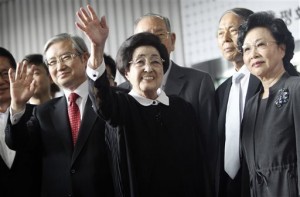- California Assembly OKs highest minimum wage in nation
- S. Korea unveils first graphic cigarette warnings
- US joins with South Korea, Japan in bid to deter North Korea
- LPGA golfer Chun In-gee finally back in action
- S. Korea won’t be top seed in final World Cup qualification round
- US men’s soccer misses 2nd straight Olympics
- US back on track in qualifying with 4-0 win over Guatemala
- High-intensity workout injuries spawn cottage industry
- CDC expands range of Zika mosquitoes into parts of Northeast
- Who knew? ‘The Walking Dead’ is helping families connect
S. Korean ex-first lady visits N. Korea, hopes of better inter-Korean ties

Lee Hee-ho, center, the wife of late former South Korean President Kim Dae-jung, waves as she arrives at Gimpo Airport in Seoul, South Korea, to leave for North Korea Wednesday, Aug. 5, 2015. Lee’s planned Aug. 5-8 trip comes amid continuing animosity between the rival Koreas following the recent opening of a U.N. office in Seoul tasked with monitoring what activists call the North’s widespread abuse of its citizens’ rights.(AP Photo/Ahn Young-joon)
SEOUL, Aug. 5 (Yonhap) — The widow of former President Kim Dae-jung visited North Korea on Wednesday for a rare four-day trip, hoping that her visit could pave the way for inter-Korean dialogue and cooperation in a landmark year.
Lee Hee-ho, 93, who was the South’s first lady during Kim’s five-year tenure until 2003, arrived in Pyongyang earlier in the day on a local plane for a trip with a humanitarian purpose.
Lee’s high-profile visit is in the spotlight on the hopes that it may help ease tension on a divided peninsula as this year marks the 70th anniversary of Korea’s liberation from Japan’s 1910-45 colonial rule and the division of the two Koreas.
“Lee voiced hope that people of the two Koreas could heal pain and wounds from a 70-year inter-Korean division and promote reconciliation and cooperation based on the spirit of June 15 (joint declaration),” Kim Sung-jae, an official at the Kim Dae-jung Peace Center, told reporters before the departure, referring to the outcome of a historic inter-Korean summit in 2000.
“She expressed wishes that this visit could pave the way for continuous dialogue, exchanges and cooperation between the two Koreas.”
Whether she could meet with North Korean leader Kim Jong-un is the focus of the South’s media attention, though nothing has been decided.
Lee briefly met with Kim in December 2011 when she visited Pyongyang to pay tribute upon the death of Kim Jong-il, the father of the North’s current leader. But the trip was limited to offering condolences and no other matters were discussed at that time.
Lee’s late husband was the architect of the “sunshine” policy that actively pushed for cross-border exchanges and reconciliation. He held the first inter-Korean summit with then North Korean leader Kim Jong-il in 2000. At that time, she accompanied her husband to Pyongyang.
During South Korea’s previous two liberal administrations from 1998 to 2008, reconciliation and exchanges bloomed on the divided peninsula.
But conservative successors have pursued a get-tough policy toward the North. Seoul-Pyongyang ties have been further strained in recent years following the North’s torpedoing of a South Korean warship and its shelling of a border island in 2010.
The two Koreas have not held high-level talks since February 2014 amid the North’s ceaseless provocations such as nuclear and missile tests.
The government said that Lee’s visit to the North itself is a “big message” for the inter-Korean ties. But it has not asked Lee to convey a special message to the North on the Seoul government’s behalf, as Lee will visit the North in a private capacity.
The ex-first lady expressed her wish to visit the North in October last year, but she had to postpone her trip due to the cold winter weather.
She sent a wreath of flowers last December to the North to mark the third anniversary of the death of Kim Jong-il. The North’s young leader said in a letter that he was “looking forward to having Lee in Pyongyang once the weather got warmer in 2015.”
Lee plans to deliver knitted scarfs and medicine to North Korean children as gifts.
Earlier in the day, Lee visited a children and maternity hospital in Pyongyang. Her itinerary includes a visit to a nursery facility in the North’s capital and Mount Myohyang in North Pyongan Province, north of Pyongyang.
The Kim Dae-jung Peace Center, the organizer for the trip, said that the 19-member delegation does not include high-profile politicians or former government officials such as opposition lawmaker Park Jie-won.
















